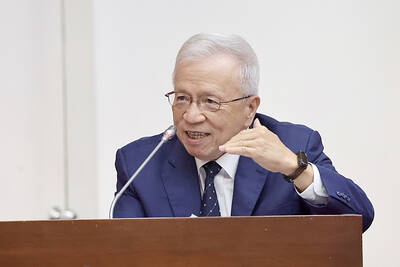China-based Tiens Group Co (天獅集團), the world's fifth-largest health products direct selling conglomerate, has ventured into Taiwan, opening its regional headquarters in the landmark Taipei 101 building.
The company also considers forming a strategic alliance with Chang Gung Biotechnology (
Li said he had visited the Formosa group and had had good discussion with the Taiwanese group's founder, Wang Yung-ching (
Because of restrictions on direct Chinese investment in Taiwan, the group's Taiwan headquarters was established under the name of its US branch, Tiens Biotech Group (USA) Inc.
The Tiens Group's regional headquarters in Taipei 101 include a health products direct selling supermarket, a product-testing zone and a training center, as well as a spa, a yoga classroom and fitness facilities.
The group plans to establish six to 10 direct selling supermarkets around Taiwan and open four to five franchised selling points in every county and city.
The group also plans to develop the tourism business in Taiwan, eyeing the cash-rich mainland Chinese, the company said.
Li founded the group in 1995 and listed its US subsidiary on NASDAQ three years ago.
The Hurun Report ranked Li the 18th wealthiest person in China last year, with assets worth 6.9 billion yuan (US$887 million).

JITTERS: Nexperia has a 20 percent market share for chips powering simpler features such as window controls, and changing supply chains could take years European carmakers are looking into ways to scratch components made with parts from China, spooked by deepening geopolitical spats playing out through chipmaker Nexperia BV and Beijing’s export controls on rare earths. To protect operations from trade ructions, several automakers are pushing major suppliers to find permanent alternatives to Chinese semiconductors, people familiar with the matter said. The industry is considering broader changes to its supply chain to adapt to shifting geopolitics, Europe’s main suppliers lobby CLEPA head Matthias Zink said. “We had some indications already — questions like: ‘How can you supply me without this dependency on China?’” Zink, who also

At least US$50 million for the freedom of an Emirati sheikh: That is the king’s ransom paid two weeks ago to militants linked to al-Qaeda who are pushing to topple the Malian government and impose Islamic law. Alongside a crippling fuel blockade, the Group for the Support of Islam and Muslims (JNIM) has made kidnapping wealthy foreigners for a ransom a pillar of its strategy of “economic jihad.” Its goal: Oust the junta, which has struggled to contain Mali’s decade-long insurgency since taking power following back-to-back coups in 2020 and 2021, by scaring away investors and paralyzing the west African country’s economy.

BUST FEARS: While a KMT legislator asked if an AI bubble could affect Taiwan, the DGBAS minister said the sector appears on track to continue growing The local property market has cooled down moderately following a series of credit control measures designed to contain speculation, the central bank said yesterday, while remaining tight-lipped about potential rule relaxations. Lawmakers in a meeting of the legislature’s Finance Committee voiced concerns to central bank officials that the credit control measures have adversely affected the government’s tax income and small and medium-sized property developers, with limited positive effects. Housing prices have been climbing since 2016, even when the central bank imposed its first set of control measures in 2020, Chinese Nationalist Party (KMT) Legislator Lo Ting-wei (羅廷瑋) said. “Since the second half of

Taiwan Semiconductor Manufacturing Co (TSMC, 台積電) received about NT$147 billion (US$4.71 billion) in subsidies from the US, Japanese, German and Chinese governments over the past two years for its global expansion. Financial data compiled by the world’s largest contract chipmaker showed the company secured NT$4.77 billion in subsidies from the governments in the third quarter, bringing the total for the first three quarters of the year to about NT$71.9 billion. Along with the NT$75.16 billion in financial aid TSMC received last year, the chipmaker obtained NT$147 billion in subsidies in almost two years, the data showed. The subsidies received by its subsidiaries —